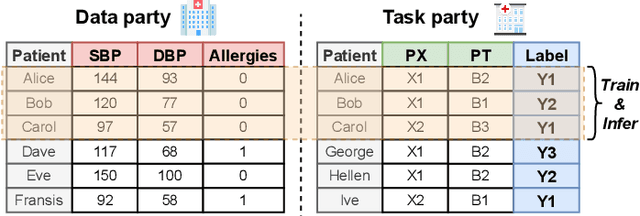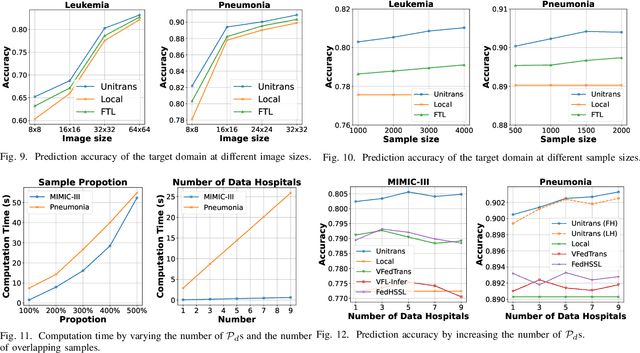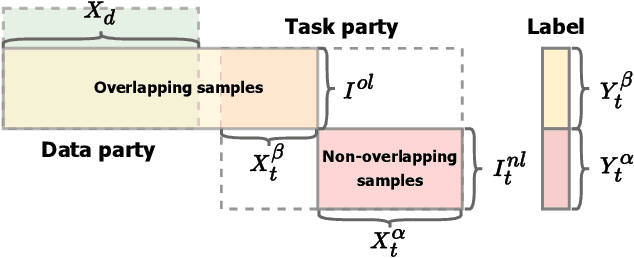Chung-ju Huang
VeFIA: An Efficient Inference Auditing Framework for Vertical Federated Collaborative Software
Jul 03, 2025



Abstract:Vertical Federated Learning (VFL) is a distributed AI software deployment mechanism for cross-silo collaboration without accessing participants' data. However, existing VFL work lacks a mechanism to audit the execution correctness of the inference software of the data party. To address this problem, we design a Vertical Federated Inference Auditing (VeFIA) framework. VeFIA helps the task party to audit whether the data party's inference software is executed as expected during large-scale inference without leaking the data privacy of the data party or introducing additional latency to the inference system. The core of VeFIA is that the task party can use the inference results from a framework with Trusted Execution Environments (TEE) and the coordinator to validate the correctness of the data party's computation results. VeFIA guarantees that, as long as the abnormal inference exceeds 5.4%, the task party can detect execution anomalies in the inference software with a probability of 99.99%, without incurring any additional online inference latency. VeFIA's random sampling validation achieves 100% positive predictive value, negative predictive value, and true positive rate in detecting abnormal inference. To the best of our knowledge, this is the first paper to discuss the correctness of inference software execution in VFL.
UniTrans: A Unified Vertical Federated Knowledge Transfer Framework for Enhancing Cross-Hospital Collaboration
Jan 20, 2025



Abstract:Cross-hospital collaboration has the potential to address disparities in medical resources across different regions. However, strict privacy regulations prohibit the direct sharing of sensitive patient information between hospitals. Vertical federated learning (VFL) offers a novel privacy-preserving machine learning paradigm that maximizes data utility across multiple hospitals. Traditional VFL methods, however, primarily benefit patients with overlapping data, leaving vulnerable non-overlapping patients without guaranteed improvements in medical prediction services. While some knowledge transfer techniques can enhance the prediction performance for non-overlapping patients, they fall short in addressing scenarios where overlapping and non-overlapping patients belong to different domains, resulting in challenges such as feature heterogeneity and label heterogeneity. To address these issues, we propose a novel unified vertical federated knowledge transfer framework (Unitrans). Our framework consists of three key steps. First, we extract the federated representation of overlapping patients by employing an effective vertical federated representation learning method to model multi-party joint features online. Next, each hospital learns a local knowledge transfer module offline, enabling the transfer of knowledge from the federated representation of overlapping patients to the enriched representation of local non-overlapping patients in a domain-adaptive manner. Finally, hospitals utilize these enriched local representations to enhance performance across various downstream medical prediction tasks. Experiments on real-world medical datasets validate the framework's dual effectiveness in both intra-domain and cross-domain knowledge transfer. The code of \method is available at \url{https://github.com/Chung-ju/Unitrans}.
A Survey on Contribution Evaluation in Vertical Federated Learning
May 03, 2024Abstract:Vertical Federated Learning (VFL) has emerged as a critical approach in machine learning to address privacy concerns associated with centralized data storage and processing. VFL facilitates collaboration among multiple entities with distinct feature sets on the same user population, enabling the joint training of predictive models without direct data sharing. A key aspect of VFL is the fair and accurate evaluation of each entity's contribution to the learning process. This is crucial for maintaining trust among participating entities, ensuring equitable resource sharing, and fostering a sustainable collaboration framework. This paper provides a thorough review of contribution evaluation in VFL. We categorize the vast array of contribution evaluation techniques along the VFL lifecycle, granularity of evaluation, privacy considerations, and core computational methods. We also explore various tasks in VFL that involving contribution evaluation and analyze their required evaluation properties and relation to the VFL lifecycle phases. Finally, we present a vision for the future challenges of contribution evaluation in VFL. By providing a structured analysis of the current landscape and potential advancements, this paper aims to guide researchers and practitioners in the design and implementation of more effective, efficient, and privacy-centric VFL solutions. Relevant literature and open-source resources have been compiled and are being continuously updated at the GitHub repository: \url{https://github.com/cuiyuebing/VFL_CE}.
Vertical Federated Knowledge Transfer via Representation Distillation for Healthcare Collaboration Networks
Feb 11, 2023Abstract:Collaboration between healthcare institutions can significantly lessen the imbalance in medical resources across various geographic areas. However, directly sharing diagnostic information between institutions is typically not permitted due to the protection of patients' highly sensitive privacy. As a novel privacy-preserving machine learning paradigm, federated learning (FL) makes it possible to maximize the data utility among multiple medical institutions. These feature-enrichment FL techniques are referred to as vertical FL (VFL). Traditional VFL can only benefit multi-parties' shared samples, which strongly restricts its application scope. In order to improve the information-sharing capability and innovation of various healthcare-related institutions, and then to establish a next-generation open medical collaboration network, we propose a unified framework for vertical federated knowledge transfer mechanism (VFedTrans) based on a novel cross-hospital representation distillation component. Specifically, our framework includes three steps. First, shared samples' federated representations are extracted by collaboratively modeling multi-parties' joint features with current efficient vertical federated representation learning methods. Second, for each hospital, we learn a local-representation-distilled module, which can transfer the knowledge from shared samples' federated representations to enrich local samples' representations. Finally, each hospital can leverage local samples' representations enriched by the distillation module to boost arbitrary downstream machine learning tasks. The experiments on real-life medical datasets verify the knowledge transfer effectiveness of our framework.
 Add to Chrome
Add to Chrome Add to Firefox
Add to Firefox Add to Edge
Add to Edge